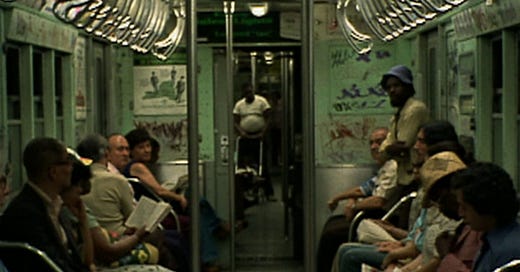Hello! Thank you for signing up to, or stumbling on, this no-news-newsletter written by me, Ashley Clark. If you do choose to subscribe—and it’s free—you’ll receive bulletins about whatever’s on my mind: usually some combination of art/film/music/literature/football. If that sounds good, hit the button!
Some strong words have been thrown around the internet this week in the wake of Sight & Sound Magazine’s coronation of Chantal Akerman’s Jeanne Dielman, 23, quai du Commerce, 1080 Bruxelles (1975) as the greatest film of all time in its influential decennial poll of critics, programmers and scholars from around the world.
The once interesting and provocative critic Armond White described the film as a “dull Marxist-feminist token”, and smelled a conspiracy, stating that “S&S’s ballot harvesting should not shock anyone in this era of rampant election irregularities in Brazil and the United States. Including the organizational elite changed the nature of the poll into cultural reengineering, largely on behalf of the left-liberal hive mind.” (I’m not going to link to the piece because it’s pretty rank, to be honest. But it’s out there if you want to find it.)
Filmmaker and critic Paul Schrader—whose First Reformed and The Card Counter I believe to be two of the best American films of recent years—also voiced his concerns. While articulating his fondness for the film, and happily endorsing its landmark status, Schrader muttered darkly that its placing in the poll “reflects not a historical continuum but a politically correct rejiggering,” and that, even worse, Jeanne Dielman “will from this time forward be remembered not only as an important film in cinema history but also as a landmark of distorted woke reappraisal.”
I think we can all agree that something fishy has gone on. I did some detective work, and could find absolutely no good reason that Jeanne Dielman, 23, quai du Commerce, 1080 Bruxelles would finish on top of the poll this year, other than: it hasn’t really been that accessible for that long, having only made its debut on US DVD three years before the 2012 poll, where it finished in 36th place (a retrospectively exponential leap from its 73rd place ranking in 2002), and made its Blu-ray debut, between polls, in 2017; Akerman passed away tragically in 2015, prompting a major surge of interest in her work, which struck a chord with a new generation of cinephiles fascinated by her skillful interweaving of themes of work, gender, feminism, queerness, labor, and memory; there were major international theatrical retrospectives of Akerman’s work following her death (I only saw Jeanne Dielman for the first time in 2016); there has been a significant, sustained and deeply serious questioning of the idea of the canon formation in the past few years (yes I’m taking a tiny little bit of credit here); and Jeanne Dielman, 23, quai du Commerce, 1080 Bruxelles is an extraordinary, one-of-a-kind, and inspired piece of filmmaking. Apart from that, I’ve got nothing. It’s a mystery.
But listen: perhaps Schrader does have half—a quarter of?—a point, at least in terms of the way I voted. I’m happy to confess that there was something a little tactical in my choice to include Jeanne Dielman on the ballot. I do love the film, but there’s a part of me that voted for it because it subscribes to some slippery, subjective, abstract notion of “greatness” (its monolithic stature, its length and rigor, its obvious influence), and because I had a semi-clairvoyant feeling that it would break the Top 10. I was initially planning to vote for my favorite Akerman film, News From Home (1976), but swapped it out when that silly “favorite vs greatest?” dichotomy started gnawing at me. I won’t say much about News From Home here, but it’s one of the most moving films I know, and I hope you’re able to check it out if you haven’t seen it.
Also, there’s been a lot of talk about how “challenging” Akerman’s films are. Yes, they are often slow, and sometimes long, but I actually find them quite generous—they’re invitations to concentrate and participate, immerse yourself in a world of another’s creation. I find them significantly less challenging than, for example, the hyper-choppy, VFX vomitoriums of most contemporary comic book blockbusters, which are touted as easygoing, crowd-pleasing fun. And besides, however slow or experimental a film is, it’s a film: you’re sitting on your arse, looking at a screen. Rock-climbing? Now that’s challenging. (I’ve never done it, and never will.)
Lastly, for those of you who are wondering why I’m spending quite so much time thinking and writing about a glorified listicle, you might be interested in—and sympathetic to—the scholar Elena Gorfinkel’s compelling polemic “Against Lists”, published in 2019 in the always excellent feminist film journal Another Gaze. Here’s an excerpt:
Claiming aesthetic supremacy begins with the list. Would that we had other ways to create spheres of value or to abolish the shallow terms of value altogether, and along with them the capricious and impoverished arbitration of what counts as cinematic art, art worth watching and worth fighting for. The list consolidates as if self-evidence, reasserting in all that it doesn’t list, all that its lister failed to learn, to see, to know.
Until next week!
Thank you for reading. Please consider subscribing to this newsletter if you’ve yet to do so, or, if you have, spreading the word. I appreciate it!





yessss we hate ranking art (and yet, we must, as it seems to be one of the few ways to get people to talk about art now)